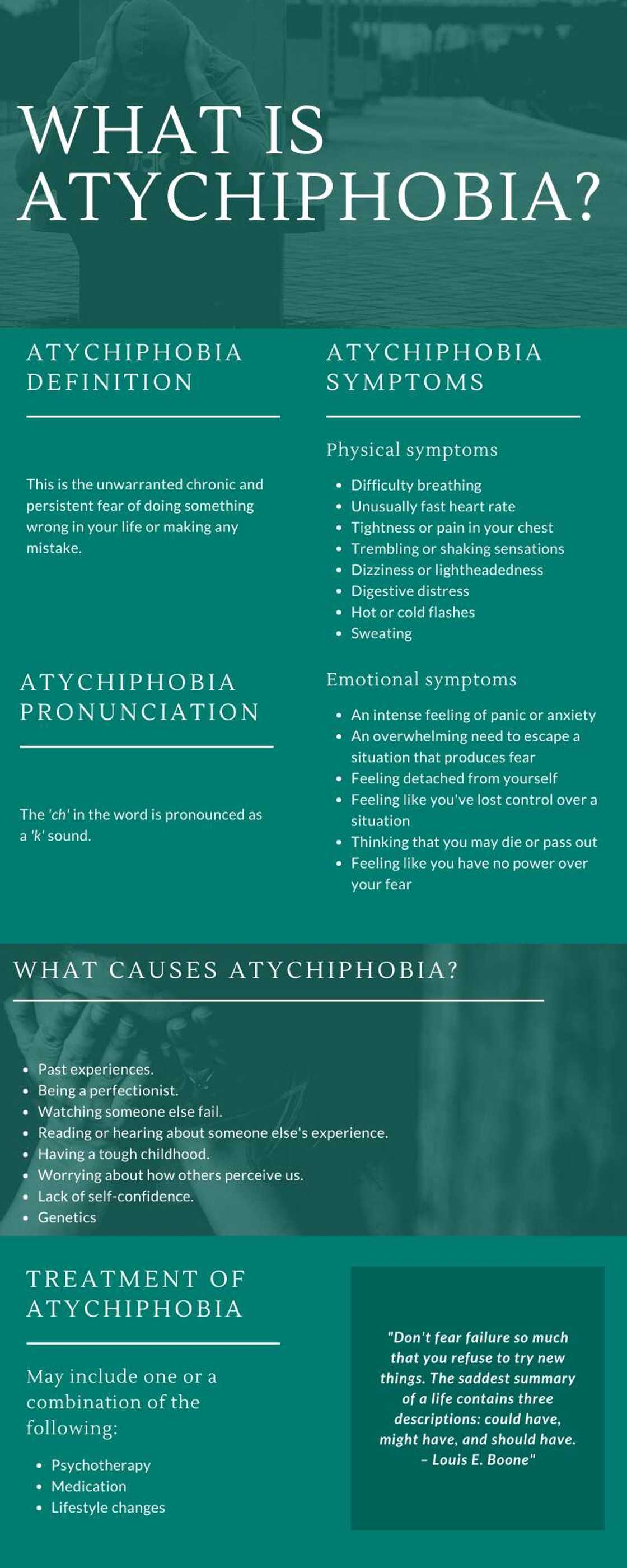Atychiphobia Pronunciation: How To Say This Tricky Word With Ease
Have you ever stumbled over a word, feeling that familiar little knot of frustration as your tongue just wouldn't cooperate? It happens to many of us, especially with terms that aren't part of our everyday chat. One such word that often poses a bit of a challenge for people is "atychiphobia." Knowing how to say it clearly can really help you feel more confident, and it just makes conversations flow better, you know?
It's interesting, really, how some words just seem to resist our best efforts to speak them out loud. My text, for instance, points out that "Pronouncing atychiphobia correctly can be quite challenging for many individuals." This isn't just about a single word; it's about feeling good when you speak, and that's something we all want, isn't it? So, we're going to look closely at this word, breaking it down so it feels less like a tongue-twister and more like something you can say with total ease.
This guide is here to help you get a real handle on "atychiphobia pronunciation." We'll explore different ways to approach it, offering practical tips and some good advice that should make a big difference. It's almost like learning a secret handshake for words, and that's pretty cool, if you ask me. So, get ready to speak with more certainty and less hesitation, because that's what we're aiming for here.
Table of Contents
- Understanding the Challenge with Atychiphobia Pronunciation
- Breaking Down the Sounds: A Step-by-Step Approach
- Tips for Mastering Atychiphobia Pronunciation
- Why Correct Pronunciation Matters
- Common Questions About Atychiphobia Pronunciation
- Putting It All Together
Understanding the Challenge with Atychiphobia Pronunciation
It's really quite common for people to find words like "atychiphobia" a bit tough to say. Why is that, you might wonder? Well, it often comes down to a few things. Sometimes, it's the sheer length of the word, or maybe it's the mix of sounds that aren't usually found together in simpler words. For "atychiphobia," you've got a blend of Greek roots, which can sometimes throw a curveball into how we naturally want to say things in English. My text notes, for instance, that "Pronouncing atychiphobia correctly can be quite challenging for many individuals," and that's a pretty accurate observation.
Another thing that makes it tricky is that we don't hear this word every single day, so our ears aren't really used to its rhythm. If you're not hearing a word regularly, your brain doesn't get that constant reinforcement, does it? This can make it feel like you're trying to say something entirely new each time, which is that little bit harder. It's a bit like trying to remember a tune you've only heard once; it takes some effort to recall all the notes.
Plus, there's the stress pattern. English words have a certain beat, and if you put the emphasis on the wrong part of a word, it can sound quite off, nearly unrecognizable sometimes. With longer words, figuring out where that main stress falls can be a bit of a puzzle. This word, "atychiphobia," has several syllables, and getting the stress just right is key to sounding natural and clear. It’s a very common hurdle for many people trying to speak new words, actually.
Breaking Down the Sounds: A Step-by-Step Approach
To really get a grip on "atychiphobia pronunciation," the best thing to do is take it apart, piece by piece. Think of it like disassembling a complex toy to see how it works, then putting it back together. This method helps your mouth and brain get used to each individual sound before trying to link them all up. It’s a very effective way to tackle any word that feels a bit daunting, you know?
Syllable by Syllable
Let's look at "atychiphobia" in its smaller parts. This word has five distinct syllables, and saying each one clearly, then slowly joining them, is the path to success. My text suggests, "Break down the word 'atychiphobia' into its individual sounds," and that's precisely what we'll do here. So, let's break it down, starting from the beginning:
- A-: This first part is like the letter "a" in "apple." It's a short, open sound. Try saying "a" on its own, just that simple sound.
- ty-: This next bit is like "ti" in "typical." The 'y' here makes a short 'i' sound. So, you're saying "ti" as in "tip."
- chi-: This is where some people might get a little stuck. The 'ch' here sounds like a 'k'. So, it's like "ki" in "kit." It's not the 'ch' sound you hear in "chair." This is a pretty important distinction, actually.
- pho-: This part sounds like "fo" in "photo." The 'ph' makes an 'f' sound. This is a fairly common letter combination in English words that come from Greek.
- bi-a: The final two letters form one syllable here. It sounds like "bee-uh." The 'bi' is like "bee" and then you just add a soft "uh" sound at the end.
Now, try saying each syllable slowly, one after the other: "A - ty - chi - pho - bi - a." Take your time with it, really feeling each sound in your mouth. This step, honestly, makes a huge difference in building confidence.
Focusing on Tricky Parts
When you're working on "atychiphobia pronunciation," there are a couple of spots that often trip people up. The first one, as we just talked about, is that 'ch' sound in "chi." Remembering that it's a 'k' sound, not a 'ch' like in 'church,' is super helpful. It's a very common mistake, so don't feel bad if you've been saying it differently.
The other part that can be a bit challenging is getting the rhythm right. The main stress in "atychiphobia" falls on the "pho" syllable. So, you're saying "A-ty-CHI-pho-bi-a." Hear that? The "CHI" part gets a little more emphasis, a bit more volume. My text advises, "Say these sounds out loud," and that's truly the best way to practice this rhythm. Try exaggerating the stressed syllable at first, then gradually make it more natural. It's almost like learning to dance to a new song, where you need to feel the main beat.
Also, the transition between "pho" and "bi-a" needs to be smooth. It's not "pho-bee-uh" with a harsh stop, but a gentle flow. Practicing these transitions slowly, then speeding up, really helps. You might find it useful to just repeat "pho-bi-a" a few times on its own, getting that flow just right. This kind of focused practice, you know, can make all the difference in the world.
Tips for Mastering Atychiphobia Pronunciation
Getting comfortable with "atychiphobia pronunciation" is something you can definitely achieve with a little consistent effort. It's not about being perfect right away, but about making steady progress. My text, for example, mentions, "Here are a few tips that should help you perfect your pronunciation of 'atychiphobia'," and these really are quite helpful. So, let's look at some practical ways to get there.
Listen and Repeat
One of the very best ways to learn how to say any new word is to listen to someone else say it correctly, and then try to copy them. My text suggests, "Listen to the audio pronunciation in several English accents," and that's a brilliant idea. There are many online dictionaries and pronunciation guides that offer audio recordings. When you listen, pay close attention to the individual sounds, the rhythm, and where the speaker puts the stress. Then, try to mimic exactly what you hear. Do this several times, until it starts to feel more natural. It's almost like learning a song by ear, you know?
Slow and Steady Practice
Don't rush it. When you're first trying to get the hang of "atychiphobia pronunciation," go very slowly. Say each syllable distinctly, then gradually speed up as you feel more comfortable. It's better to say it correctly slowly than to rush and make mistakes. My text encourages us to "Say these sounds out loud," and that consistent, deliberate practice is key. You might even find it helpful to say it syllable by syllable for a while before trying to say the whole word quickly. This builds muscle memory in your mouth, which is very important for clear speech.
Record Yourself
This tip might feel a little awkward at first, but it's incredibly effective. Use your phone or computer to record yourself saying "atychiphobia." Then, play it back and compare it to a native speaker's pronunciation. You might be surprised by what you hear! This helps you identify exactly where you might be going wrong, whether it's a specific sound, the rhythm, or the stress. It's a bit like looking in a mirror when you're trying to fix your hair; you can see what needs adjusting. This self-correction process is really powerful for improving your speech, honestly.
Connect It to Meaning
While this guide focuses on "atychiphobia pronunciation," knowing what the word means can sometimes help you remember how to say it. "Atychiphobia" refers to the fear of failure. When you understand the concept, the word might feel less abstract and more concrete. This connection can sometimes make the sounds stick better in your mind, too it's almost like giving the word a personality. It’s not just a string of sounds then, but a concept with a name, and that can make it easier to recall. You can learn more about the meaning of this and other words on our site, for instance, by checking out our glossary of phobias. It's a useful resource, really.
Why Correct Pronunciation Matters
Getting "atychiphobia pronunciation" right, or the pronunciation of any word for that matter, is more important than you might first think. It's not just about sounding smart, though that's a nice bonus! Primarily, it's about clear communication. When you say a word correctly, people understand you without any confusion, and that's the whole point of talking, isn't it? It helps your message get across exactly as you intend it to.
Secondly, it can really boost your confidence. When you know you can say a word accurately, you're much more likely to use it in conversation. This means you can express yourself more fully and precisely. There's nothing quite like the feeling of speaking clearly and being understood, and that's a very empowering thing. It's almost like finding your voice, in a way, especially with words that used to trip you up.
Also, correct pronunciation shows respect for the language and for your listeners. It shows you've put in the effort, and that you care about being understood. This can make a good impression, whether you're chatting with friends or speaking in a more formal setting. It's a small detail, perhaps, but one that can make a pretty big difference in how you're perceived. My text even provides recordings from "native speakers' recordings feature English and American spellings and definitions, delivering a natural and clear" sound, which just shows how much emphasis is put on clarity.
Finally, practicing difficult words like "atychiphobia" helps improve your overall speaking skills. It makes your mouth and tongue more agile, and your ears more attuned to the subtleties of sounds. This practice spills over into other words, making you a more fluent and articulate speaker generally. It's a bit like going to the gym for your vocal cords, strengthening them for all sorts of linguistic workouts. So, every time you work on a tricky word, you're actually improving your whole way of speaking, which is a significant benefit.
Common Questions About Atychiphobia Pronunciation
People often have similar questions when they're trying to figure out how to say "atychiphobia" correctly. It's natural to wonder about these things, especially with words that aren't everyday vocabulary. So, let's address some of the common inquiries that pop up, because that's what we're here for, right?
Is there a simpler way to remember how to say "atychiphobia"?
While there isn't a magic trick, breaking it down into syllables and focusing on the 'k' sound for 'ch' is the simplest method. Think of it as "uh-TICH-ih-FOH-bee-uh." The "TICH" part is the one to really hit, and that's a helpful memory aid for many. My text mentions, "Break down the word 'atychiphobia' into its individual sounds," and that's truly the most straightforward path. It's almost like learning a simple rhyme to remember something complex.
What are the most common mistakes people make when pronouncing "atychiphobia"?
The two biggest mistakes are usually mispronouncing the 'ch' as in 'chair' instead of a 'k' sound, and putting the stress on the wrong syllable. Some people might say "a-TY-chi-phobia" or "a-ty-chi-PHO-bia" instead of "a-ty-CHI-pho-bi-a." Getting that "k" sound for "ch" and putting the main emphasis on the "CHI" syllable are the keys to sounding correct. It's a bit like missing a step in a dance; it throws the whole rhythm off. My text states, "Here you will hear how to pronounce atychiphobia (correctly!) i.e, The “correct” pronunciation," which highlights that there's a specific way it's generally accepted.
Where can I find audio examples of "atychiphobia pronunciation"?
Many online dictionaries and specialized pronunciation websites offer audio recordings. Just search for "atychiphobia pronunciation" on your preferred search engine, and you'll find several options. My text explicitly mentions, "Pronunciation of atychiphobia with 23 audio pronunciations and more for atychiphobia," and also, "Learn how to pronounce atychiphobia in English with native pronunciation." These resources are incredibly helpful because hearing the word spoken by a native speaker is arguably the best way to learn. It's like having a personal tutor right there with you, which is very convenient.
Putting It All Together
So, we've gone through the ins and outs of "atychiphobia pronunciation," breaking it down into manageable parts and looking at some helpful strategies. It's clear that while the word might seem a bit daunting at first, with a little practice and the right approach, you can certainly master it. Remember, it's about taking it syllable by syllable, focusing on that "k" sound for the "ch," and getting the stress right on the "CHI" part. My text, for example, really emphasizes that "Pronouncing atychiphobia correctly can be quite challenging for many individuals," but also offers the hope that "In this guide, we will explore the formal and informal ways to say atychiphobia, providing tips."
The journey to clearer speech is a continuous one, and every new word you learn to say correctly adds to your confidence and communication skills. Don't be afraid to sound out words slowly, or to record yourself. Those little steps really add up over time. It's almost like building a muscle; the more you use it, the stronger it gets. So, keep practicing, and you'll find yourself speaking with greater ease and clarity, which is a wonderful thing.
If you're curious about other complex terms or want to expand your vocabulary, there's a whole world of words waiting for you. You can always learn more about other fascinating words and their pronunciations on our site. Keep that curiosity alive, because that's how we grow and learn, isn't it? And remember, every time you conquer a tricky word, you're not just learning a sound; you're building a stronger, more confident you. Keep going, because you're doing great!

What is atychiphobia: Definition, pronunciation, common symptoms - Legit.ng

What is atychiphobia: Definition, pronunciation, common symptoms - Legit.ng

What is atychiphobia: Definition, pronunciation, common symptoms - Legit.ng